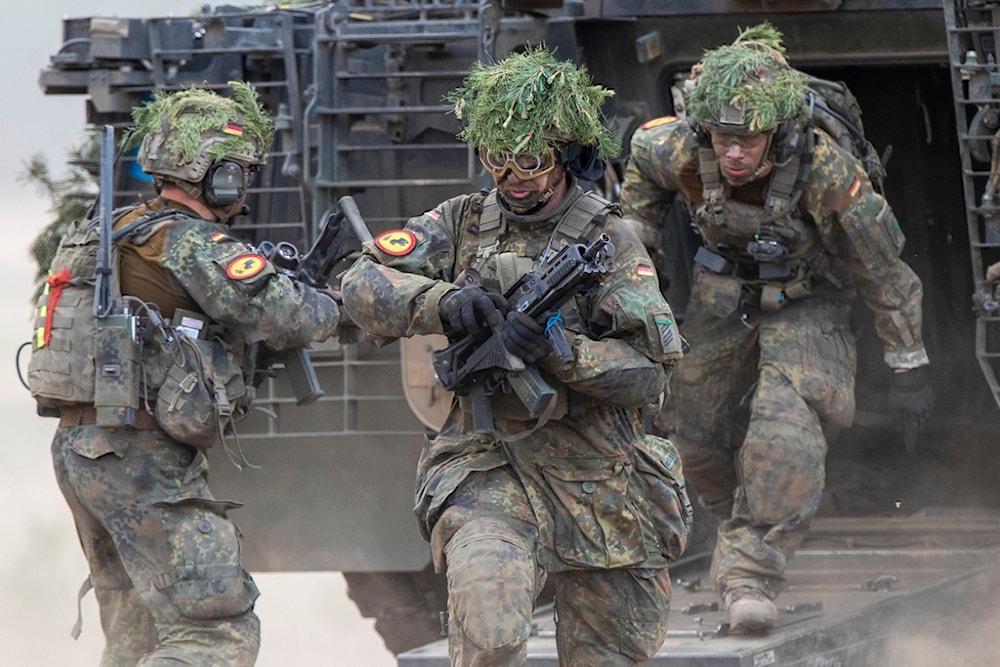One in four new recruits in German army drop out within six months: FT
Eva Högl, Germany's commissioner for the armed forces, warns of increasing personnel shortages and challenges facing the Bundeswehr, despite some recent reforms.
-

German soldiers take part in the Lithuanian-German division-level international military exercise 'Grand Quadriga 2024' at a training range in Pabrade, north of the capital Vilnius, Lithuania, on Wednesday, May 29, 2024. (AP)
One in four new recruits to the German armed forces drop out within six months, according to the country’s military oversight body, which has raised concerns that personnel shortages are pushing the military "to breaking point," Financial Times reported on Tuesday.
Eva Högl, the German parliament's commissioner for the armed forces, highlighted that while recruitment efforts have had some success, poor retention rates have left the military far from reaching its target of 203,000 soldiers by 2031. Instead, the total force size has slightly declined to just over 181,000, even as Germany pledges to enhance Europe’s defense amid the potential withdrawal of US support from the continent.
"The Bundeswehr is shrinking and getting older," Högl stated as she presented the annual report on the military's state, noting the average age of soldiers has risen to 34 years, up from 33.1 years in 2021.
"This development must be stopped and reversed as a matter of urgency," she stressed.
She explained how "the troops are challenged, but they are also very overburdened. I’ll go as far as to say they’re at breaking point. When we look at where our Bundeswehr is needed — for national defence, [Nato] alliance defence, international crisis management — it is a lot. And it really is at the limit."
Högl’s warning comes as Europe faces uncertainty following US President Donald Trump’s decision to end support for Ukraine and the potential shift in Washington’s longstanding security commitments to the continent.
While discussions were ongoing in Saudi Arabia between US and Ukrainian delegations about the potential of a ceasefire with Russia, Högl stated that it was "premature" to discuss deploying troops to Ukraine to oversee such a ceasefire.
She emphasized that Europe's largest and wealthiest nation must carefully assess what the Bundeswehr can realistically handle and what may be beyond its capacity.
Despite the worrying personnel situation, Högl acknowledged significant progress made in the past few years following decades of underinvestment in the German armed forces.
She commended Defense Minister Boris Pistorius for his reforms, supported by Chancellor Olaf Scholz’s 2022 "watershed moment" for German security, which included the announcement of a €100 billion defense fund.
Friedrich Merz, the winner of last month’s federal elections, recently proposed a plan for unlimited borrowing to further increase defense spending to continue the overhaul, the report recalled.
Highlighting some improvements, Högl noted the German navy’s elite diving force finally received a long-awaited diving practice hall after a 13-year wait.
She also pointed out that soldiers received new 110-litre backpacks and that the military successfully procured 60,000 hearing protection headsets designed to reduce gunfire noise while allowing communication during shooting. Despite delays in introducing a new digital radio system, several battalions adopted it in 2024.
However, challenges persist, including a lack of digitalization, excessive bureaucracy, and the poor condition of some military facilities. Högl cited a damaged set of hall doors at a military base in Koblenz, which led to serious injuries but were not replaced until this year, despite the need dating back to 2017.
Read more: German government looking into ways to prevent Nord Stream 2 relaunch

 3 Min Read
3 Min Read








